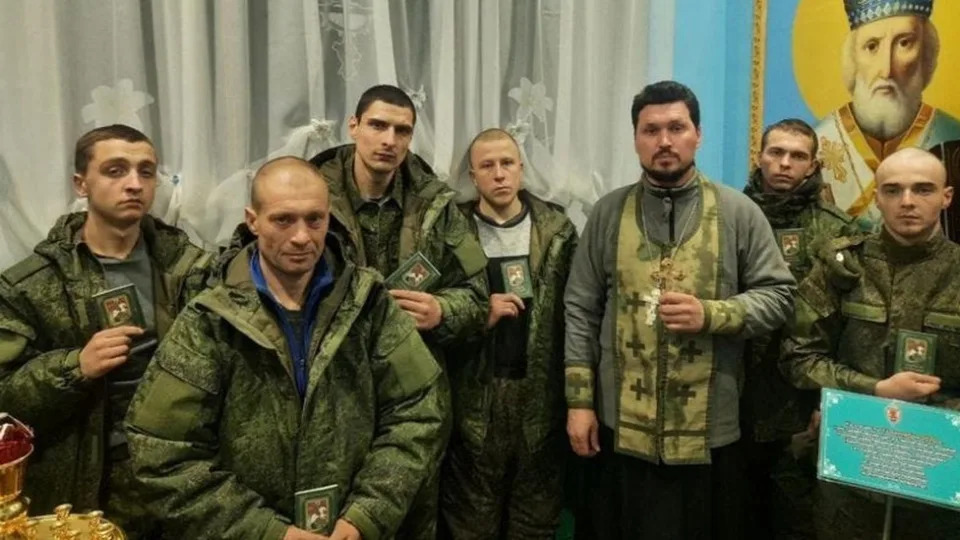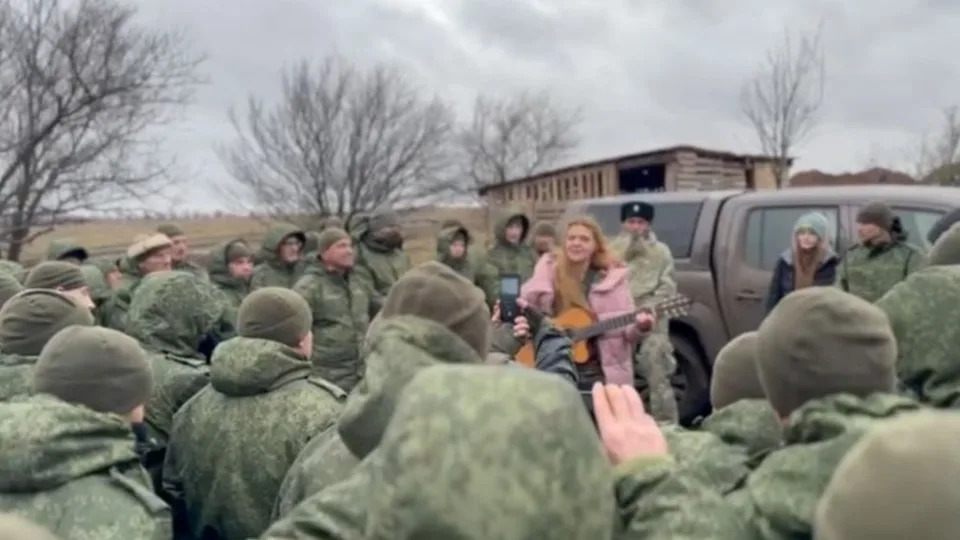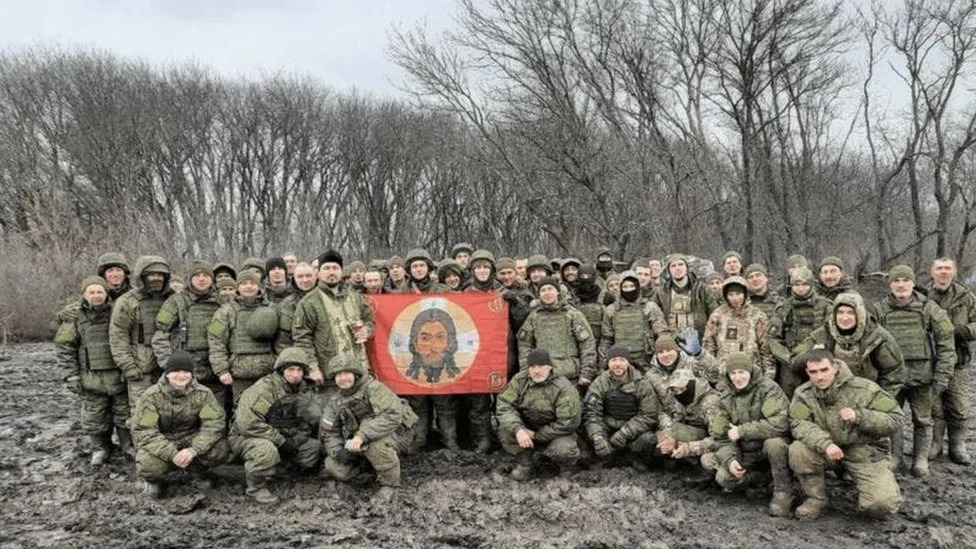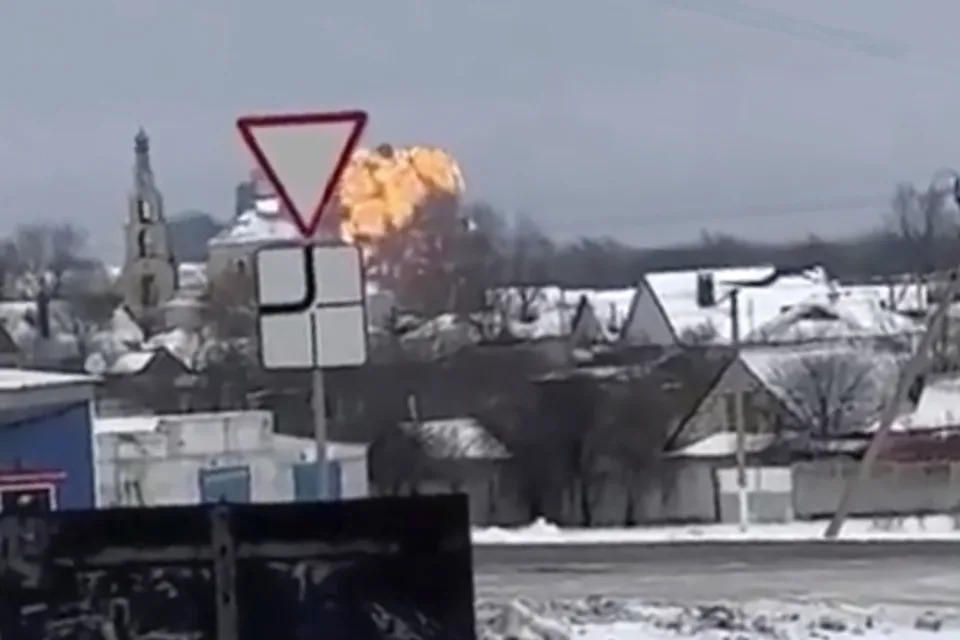Russia has been releasing prisoners to fight in Ukraine for more than a year, originally offering them a pardon and freedom after six months, even if they have been convicted of a violent crime.
Fighters of a Storm V unit at Christmas prayers, January 2024.
But the BBC has discovered this deal is a thing of the past. Now, they no longer get a pardon, face tougher conditions and instead of going home early, they must fight until the end of the war.
"If you sign up now, be ready to die," writes a man called Sergei in a chatroom for former Russian prisoners fighting in Ukraine.
He says that since October he's been part of a new type of army unit with the name "Storm V" which convicts are now being assigned to.
"Before you could wing it for six months. But now, you have to make it until the end of the war," he writes.
When the mass recruitment of Russian prisoners started in the summer of 2022, it was led by Yevgeny Prigozhin, once the head of the Wagner private military group. Prisoners were offered a clean record, full pardon and allowed to go home after six months on the battlefield.
Before he died in a plane crash in August, Prigozhin said that almost 50,000 Russian prisoners had been dispatched to the front line under this deal - similar figures have been cited by human rights activists. Thousands of those prisoners died, but others, including dozens convicted of violent crimes returned home, with some going on to re-offend and even commit murder.
The Russian military took over the scheme in February 2023, initially offering the same incentives as Prigozhin.
But the arrangement meant prisoners released to fight could go home after six months and were in a more privileged position than regular soldiers. That upset men who had been mobilised and their families.
Now, new conditions for prisoners redress that balance and are far stricter.

From reviewing messages in chatrooms and speaking to fighters and relatives, the BBC can confirm that Storm V troops are currently serving along the front line, from Zaporizhzhia in the south of Ukraine to Bakhmut in the east.
One woman from the Transbaikal region in Russia's Far East, who wished to remain anonymous, told the BBC her husband was recruited into one of the Storm V squads at the beginning of autumn 2023. She would not reveal what crime he had committed, but said it was "a serious charge".
She said they made the decision together that he would fight in Ukraine, believing it would result in a quicker release.
"This February would have been 15 years since he was sentenced. He had another four to go," she said. "Conditions in the prison were OK. He could have continued to serve his sentence, but this was the only way to get him home quickly."
She said his contract with the Russian Ministry of Defence was for a year, not six months, as it was for previous prisoners. And when her husband's time is up, he won't get a pardon and won't be able to go home immediately as the contract "will be automatically extended".
Posts on social media from other Russians whose relatives are serving in Storm V units indicate they too will have to stay on the front line until the end of what Moscow calls its "special military operation".
Prisoners are warned about this when they sign up, and it follows a September 2022 decree by Vladimir Putin which essentially means that when a contract expires it can't actually be terminated and is renewed.
Now the only way for prisoners to get a full release is if they get a state decoration, become incapacitated, reach the maximum age limit, or if the war itself ends.
Instead of a pardon, former prisoners now get what is described as a conditional release at the end of their time with the army. That means if they are found guilty of committing a new crime their sentence will also reflect their previous convictions.
President Putin is also no longer involved in personally signing pardons, which means fewer unwelcome headlines in the media about him pardoning people convicted of murder and sex crimes.

The BBC has reviewed many posts in chatrooms from men who say they have been on the front line in these units.
"The conditions are sort of better. You get full pay, like in the military, and all the other benefits and allowances," one convict writes.
"Your chances of survival are about 25%. I've been a stormtrooper for five months. Out of our platoon of about 100 men, only 38 are still alive," another says.
Many of the Storm V troops are trained at a range for as little as 10 days before being despatched. There are several dozen known cases of convicts who have found themselves on the front line after only three to five days of training. In comparison, Soviet conscripts in Afghanistan got up to six months' training before deployment.
Since January 2023, BBC Russian has partnered with the Russian website Mediazona and a team of volunteers to identify the names of Russian fighters killed in the war. More than 8,000 prisoners have died serving in Ukraine, and at least 1,100 of them fought in Storm V units or the units they replaced.
We only include in our database those prisoners whose sentences have been confirmed by a published court verdict. But not all verdicts are digitised, and not all deaths are reported. In reality, the number of dead convicts is estimated to be far higher.
Working out how many have been killed is extremely difficult, especially as many of those who die are not found straight away.
Many relatives are still looking for fighters who they lost touch with last summer.
"This hell will never end. I never thought I would be glad just to find his bones. Just to bury them," writes one mother in a chatroom.
In the past, the details on convicts' dog tags were not always entered into military databases, but that has changed - members of Storm V units are now processed as military personnel rather than volunteers.
For the Storm V fighters that survive, many end up in captivity and the BBC has seen videos which purport to show prisoners of war being interrogated by the Ukrainian military.
In one, a man says he has been in prison several times since 2014 for grievous bodily harm and theft. The BBC has been able to identify him and confirm the sentences using court records.
The man signed a contract in October with the defence ministry and went to the front from a high-security facility. He was later captured and under duress said that Storm V fighters are often sent on "pointless assaults" from which only a few individuals return. He said if they refuse to go, they are put in a pit in the ground and are not given any food.
His account matches others including that of a woman from Siberia who told the BBC her husband had said the same thing.
In a chatroom, Sergei discusses the fate of Russian convicts like himself still fighting in Storm V units.
"Luck isn't going to be enough," he writes, talking about his chance of survival on the front line.
"I already know I won't make it," he says.
Ukraine says Russia refuses to turn over the bodies of military plane crash victims
Russia has refused Ukrainian requests to hand over the bodies of scores of prisoners of war whom the Kremlin claims were killed in the downing of a Russian military transport plane by Kyiv's forces, a Ukrainian intelligence official said.
Andrii Yusov, the spokesperson for Ukraine's military intelligence, in televised remarks late Thursday reaffirmed Kyiv's call for an international probe into the Jan. 24 crash inside Russia that would determine whether the Il-76 transport carried weapons or passengers along with the crew.
Russia accused Ukraine of killing its own men, while Kyiv dismisses Moscow’s assertions as “rampant Russian propaganda.”
Kyiv has neither confirmed nor denied that its forces shot the plane down, and Russia’s claim the crash killed Ukrainian POWs couldn’t be independently verified. Ukrainian officials emphasized that Moscow didn’t ask for any specific stretch of airspace to be kept safe for a certain length of time, as it has for past POW exchanges.
Some Western intelligence assessments have suggested the plane was shot down by a missile from Ukraine, although they could not confirm the presence of POWs on board.
A French military official told The Associated Press that the country’s military concluded that Ukrainian forces used a battery of Patriot surface-to-air missiles to shoot down the Il-76, firing from about 50 kilometers (about 30 miles) away.
The official, who spoke on condition of anonymity to divulge the intelligence findings, said the Ukrainian battery apparently managed to stay hidden while getting closer to the target and then switched on its radar “just long enough to hit them.”
Another Western official also said the plane was downed by “a missile strike rather than any kind of mechanical failure,” and it’s almost certain the missile was fired from Ukrainian territory. The official said “it’s not yet clear” whether it was carrying Ukrainian POWs.
Kremlin spokesman Dmitry Peskov told the state RIA Novosti news agency on Friday that the Kremlin hadn't received a Ukrainian request to hand over the bodies. Asked if Russia would be willing to hand them over, he later told reporters that the official investigation into the incident was continuing and it would be up to Russian law enforcement agencies to consider such a request.
President Vladimir Putin said Wednesday that Russia wouldn’t only welcome but would “insist” on an international inquiry into the plane's downing that he described as a “crime” by Ukraine.
Yusov, the Ukrainian intelligence spokesperson, said some of the Ukrainian POWs who were meant to be part of an exchange on the day of the crash were swapped Wednesday when about 200 Ukrainian prisoners returned home.
Russia’s Investigative Committee, the main state criminal investigation agency, said Thursday its probe of the crash found that the Il-76 was brought down by one of the U.S.-made Patriot air defense systems, which Western allies — namely the U.S., Germany and the Netherlands — have supplied to Ukraine. The U.S. has provided the Patriots with the understanding that they not be used outside of Ukraine
Russian officials claimed there were 74 people on board, including 65 Ukrainian POWs, six crew members and three Russian servicemen. All were reported killed when the plane hit the ground and exploded in a giant fireball in the Belgorod region near Ukraine.
The Investigative Committee said investigators have found over 670 body fragments and identified all of the crash victims.
The committee said it also has recovered 116 pieces of two missiles that were fired from a Patriot system from near the village of Lyptsi in Ukraine's Kharkiv region. It showed a video that purported to show some missile fragments lying in the snow with visible markings.
Ukraine previously claimed credit for a May 2023 cross-border strike with Patriot missiles.
Ukrainian air force spokesman Yuriy Ihnat said in an interview in November the Ukrainian military used Patriots to down two Russian warplanes and three helicopters over Russia’s Bryansk region in May in what he called a “brilliant” operation.
With the 1,500-kilometer (930-mile) front line remaining largely static as the war approaches the two-year mark, Russia has continued to pummel Ukraine with long-range strikes.
Meeting with arms industry workers on Friday in the Russian city of Tula, Putin described the fight in Ukraine as a battle for Russia’s survival and that the vast majority of his countrymen support his course.
“If the public hadn’t felt that way, nothing would have happened,” he said. “We are doing what people expect us to do.”
He said sending troops into Ukraine was necessary to protect Russian speakers in eastern Ukraine and stop what he described as attempts by Washington and its NATO allies to encroach on Moscow’s vital security interests. Ukraine and its Western allies have denounced it as an unprovoked act of aggression.
In Kryvyi Rih, Ukrainian President Volodymyr Zelenskyy’s hometown, a drone attack damaged an energy infrastructure facility, leaving 100,000 people without electricity and 113 coal miners stranded underground for a time, according to Mayor Oleksandr Vilkul. All the miners were brought to safety after power was partially restored, he said.
Another Russian strike Thursday killed two French aid workers in the town of Beryslav in the southern Kherson region, Gov. Oleksandr Prokudin said. French President Emmanuel Macron denounced the attack as “cowardly and outrageous.”
Russian forces also carried out an airstrike Friday on the city of Kherson that left at least two people wounded, according to local officials. A three-story residential building was partially destroyed and many others were damaged.




